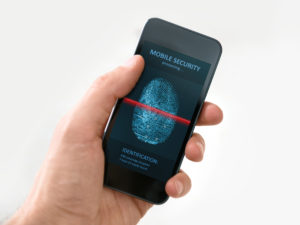
The Minnesota Supreme Court heard a case yesterday that is garnering national attention for how it may affect future cases throughout the country. The case centers around the question of when a person can be ordered to unlock their cell phone in order for police or government officials to look through it for evidence. At what point do a person’s rights to protect themselves against self-incrimination go out the window?
The initial case began back in 2015 when Matthew Diamond was convicted of burglary, theft and criminal damage to property. Part of the evidence used to convict Diamond came from his own cell phone. While Diamond was in jail for an unrelated case, his phone was stored in the property room. A Chaska police detective investigating the burglary case obtained a warrant to search Diamond’s phone, but found it to be encrypted with fingerprint access technology. The state issued an order compelling Diamond to give a fingerprint, but Diamond’s lawyer argued that he shouldn’t have to on Fifth Amendment grounds.
A district court ruled that Diamond must provide the prosecution with a fingerprint, lest he be found in contempt by the court. He acquiesced, and what was found on his phone ultimately helped convict him of the charges.
Arguing Over Specifics
The case gets even more interesting when we look at some of the details being argued. It’s in these details that a defense attorney can oftentimes make their case. The order given to Diamond stated that he had to “provide a fingerprint or thumbprint as deemed necessary by Chaska police.” When given the order, Diamond asked which fingerprint the officers wanted, to which they responded “the one the opens it.”
Diamond’s attorney, Steven Russett, argued that had the order simply stated that Diamond had to give a fingerprint, there would have been no Fifth Amendment violation, but because his client was compelled to give information about which finger unlocked the phone, he was therefore admitting the phone was his and he had access to it. The Fifth Amendment of our Constitution protects against what’s known as compelled “testimonial communications,” whereas collecting fingerprints in general is not protection.
“If the order said, ‘You may take his fingerprints,’ I wouldn’t be here,” Russett said. By telling police which finger was needed to unlock the phone, the action “became a communicative act,” argued Russett.
The prosecution is arguing that Russett created the communicative act on his own by asking the question about which finger they wanted, instead of simply giving them his hand.
In 2015, a Carver County District Court did not find that Diamond’s Fifth Amendment rights were violated, and earlier this year the Court of Appeals agreed with the lower court’s ruling. Now the case sits in front of the state Supreme Court. We’ll keep a close eye on the justices to see how they rule on this case, because it could have a significant impact on Fifth Amendment protections in the digital age.





